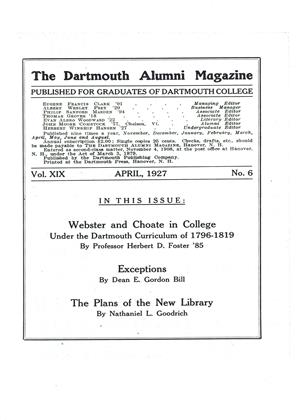The annual dinner of the Boston Alumni Association was held at the Copley Plaza on Saturday evening, January 29. We were very fortunate in having a warm spring-like day, so that the attendance was particularly gratifying. Well over 700 men were present, and the younger classes were particularly well represented.
The keynote of the dinner was an atmosphere having to do with the activities of the Outing- Club. Carl Shumway and a group of cohorts constructed an excellent representation of a cabin, about which were grouped a number of outing club scenes, snowshoes, and ski paraphernalia. All of the diners wore green crepe paper toques, which added a lot to the picture. From Hanover eame the Dodo Trio, and these fellows were a distinct hit. Jack English '16 rounded up a group of Glee Club singers, who gathered around the cabin fire and brought back memories of the days spent in the actual cabins on the hills.
President N. W. Emerson '00 presided. The invocation was given by Rev. Howard Chidley '06 of Winchester, Mass. In addition to the speakers and entertainers at the head table were Messrs. Parkhurst and Tuttle, representing the trustees, and Joseph Bartlett, the new president of the Association for this year.
The first speaker was Professor Leland Griggs. No word can describe his subtle and unexpected humor. We say "unexpected," not because it seems illogical in connection with Leland Griggs, but because the transition from the serious to the comic is so sudden. Every one was shocked to learn that after forty years of study with the idea of becoming a naturalist, Professor Griggs finally found himself only an orator.
His tribute to the value of the Outing Club for the non-fraternity man and his general philosophy in reference to the youth of today was splendid. As one man said, after Leland Griggs had finished speaking the dinner was a success.
Dr. Farrand gave a very gracious and constructive talk. After emphasizing the fine relationship between Cornell and Dartmouth, he expressed his opinion as to the youth of today. His thinking coincides entirely with that of President Hopkins, and shows the intimate contact which both of these educators have with the youth and their appreciation and understanding of his mental processes.
Dr. Farrand showed a very fine conception of the purpose of a liberal arts college like Dartmouth. It is seldom that the head of another institution is able to summarize so keenly and clearly the aims of the college and the good that it may be able to do in this rapidly changing world.
The fine spirit of Dr. Farrand's talk and his breadth of knowledge and viewpoint made him one of the most delightful speakers that we have ever had, and also one of the most instructive.
Dean Laycock closed the formal part of the entertainment in his usual vigorous and" eloquent way. After describing some of his experiences with boys, which are always fascinating, he spoke of the administrative, financial, and educational problems of the College. His optimism was most pronounced and his message inspiring.
It is seldom that three speakers are able, individually and collectively, to hold the attention of their audience as closely as these three men did. They gave us one of the. best programs that we have ever had.
Of course, there was a feeling of general regret that President Hopkins could not be present, but his Hanover substitutes proved indeed that the administration is not lacking in oratorical ability. It was a very pleasant occasion.
 View Full Issue
View Full Issue
More From This Issue
-
 Article
ArticleWEBSTER AND CHOATE IN COLLEGE
April 1927 By Herbert Darling Foster '85 -
 Lettter from the Editor
Lettter from the EditorEditorial Comment
April 1927 -
 Article
ArticlePRESIDENT HOPKINS SUGGESTS FOOTBALL MODIFICATIONS
April 1927 -
 Article
ArticleEXCEPTIONS
April 1927 By E. Gordon Bill -
 Class Notes
Class NotesClass of 1921
April 1927 By Herrick Brown -
 Sports
SportsDARTMOUTH QUINTET WINS FIRST LEAGUE CHAMPIONSHIP
April 1927
Article
-
 Article
ArticleTraditionally this month
APRIL 1930 -
 Article
ArticleNew Bridge in Grant
DECEMBER 1968 -
 Article
ArticleTuck School
OCTOBER 1969 By BOB KIMBALL T'48 -
 Article
ArticleThe Undergraduate Chair
December 1973 By DREW NEW MAN'74 -
 Article
ArticleHanover Browsing
March 1946 By HERBERT F. WEST '22 -
 Article
ArticleGreen Meals
June 1994 By Robert H. Nutt '49


